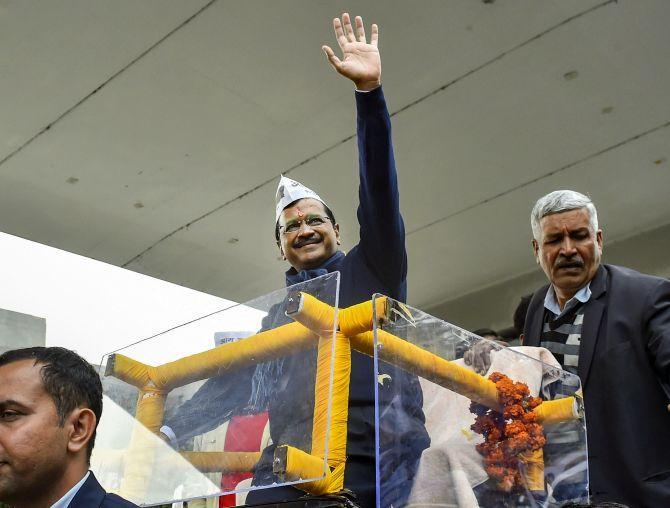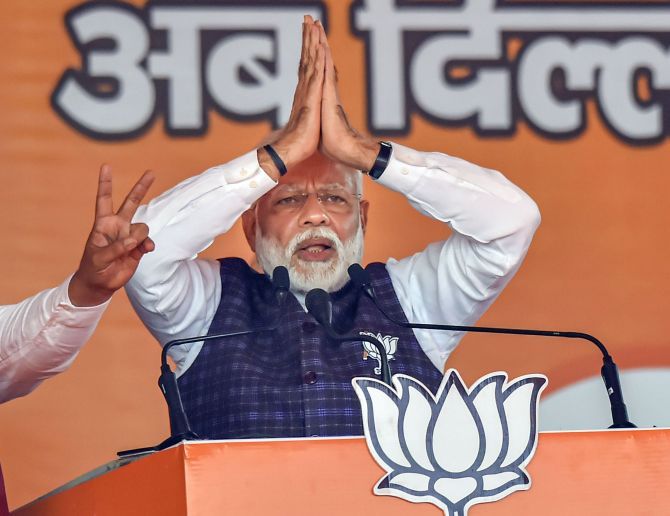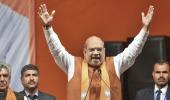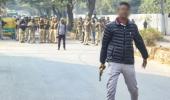If Kejriwal wins the Delhi election, then most regional parties will copy Kejriwal's do's and don'ts of jugaad to win an election against the Modi-Shah juggernaut, reports Sheela Bhatt.

On February 11, when the results of the assembly election to 70 seats in New Delhi are declared, there will be realisation that the mass movement against the Citizenship (Amendment) Act has greatly weakened.
Whoever wins the assembly election -- the incumbent Aam Aadmi party or its main challenger, the Bharatiya Janata Party -- the movement against the CAA will be weakened because incumbent Chief Minister Arvind Kejriwal never made the CAA his poll plank, he stuck to civic issues of the capital city.
He avoided the political land mines of the Hindu-Muslim debate and did not once visit Shaheen Bagh in Delhi where large numbers of Muslim women have been protesting against the CAA since December 15.
He avoided exclusive support to Muslims and by doing so he avoided taking part in the ideological war that broke out after Parliament passed the CAA on December 11.
He kept his politics far away from the so-called 'secular-liberal' groups and also didn't pit himself against the 'bigotry of the BJP'.
Kejriwal didn't ask for votes to defeat the idea behind the CAA. His statement against Shaheen Bagh disappointed many 'secular liberal' activists who are working hard to oppose the CAA.
So his victory -- if it comes -- isn't interlinked directly to the CAA and it is not because of what the anti-CAA crowd stands for. He only tried to present himself as a different shade of Hindu.
Kejriwal went to the extent of saying that if law and order were under him -- law and order in the national capital is the Union home ministry's responsibility, not the Delhi government's -- he would have vacated the Shaheen Bagh sit-in protest in an hour. He supported those who complained about the traffic jams created by the Shaheen Bagh protests.
On the other side of the election battlefield, calculations were made to suit timing.
Prime Minister Narendra Damodardas Modi and Home Minister Amit Anilchandra Shah were probably keeping their powder dry to take on all India-based anti-CAA protestors during the much more important Bihar election, but when anti-BJP thinkers, activists, Muslims, political leaders and urban youth staged successful dharnas all over India and made the Shaheen Bagh protests their epicentre, Modi-Shah, well-experienced with Ahmedabad's communally sensitive areas of Vejalpur-Juhapura's political dynamics turned the Delhi election into a wider and deeper nationalist battle.
Modi-Shah saw political opportunity in the anti-CAA protests inside the politically sensitive geography of Shaheen Bagh. Without the country-wide anti-CAA protests, the Delhi election would have been a cakewalk for Kejriwal, claims a senior BJP leader.
As it is, the government could not have ignored the protestors for long because an absence of a response would have made it look weak.
After watching closely 8 to 10 days of anti-CAA protests, Modi-Shah decided to use the event of the half-state Indian election into a full-fledged war against anti-CAA forces.
A few days after the women of Shaheen Bagh started their protests and attracted national attention, more than 200 BJP leaders were called to New Delhi to get a briefing on the CAA. At that meeting, Shah, who was then BJP president, told party leaders to launch a pro-CAA counter agitation.
He explained its cultural, nationalist dimensions and its link to the party's conviction since 1947. He was clear that the party had to to pick up the fight and told BJP leaders to not remain "confused at all".
The Delhi election became an excuse that Shah grabbed to push his politics behind enacting the CAA to a larger audience. Also, it served Shah's pet agenda of bringing 'nationalism' as a fulcrum of Indian politics which would get maximum attention at election time, that too in the national capital.
At the same time, by owning up the election, Shah has retained his number two position in the party even though he is no longer BJP president.
His strong leadership of the Delhi election campaign has helped him reassert his position without the tag of party president under Modi's tight watch. It was displayed throughout the election campaign that he remains the most powerful leader after Modi in the BJP.
Anti-CAA slogans, songs, chants and speeches have been targeting Modi and Shah more than the BJP and the Rashtriya Swayamsevak Sangh. The fury of anti-CAA voices have been specifically directed against Shah as he is seen as the pivoting force behind the CAA.
The Delhi election had looked more or less settled in Kejriwal's favour in November. But once the BJP used the Delhi election to give a political response to the anti-CAA movement through electioneering, then all hell broke loose.
The local election became sort of national and more than the victory, the issues raised during the election and in the way it were raised became more serious.
In the way Shah handled the Delhi election campaign, he expanded the scope of BJP versus anti-BJP tussles.
By dragging the CAA to the centre of the Delhi election campaign, Shah conveyed to his voter base that it is the BJP's conviction that India would not deny any Hindu citizenship of India.
This hidden message helped him consolidate his saffron voter base. Many analysts saw the BJP's 'shock and awe' negative campaign as the party's attempt to seek respectable defeat.
Shah's brazen politics, Anurag Thakur's violent calls and Pravesh Varma's toxic stance unsettled the AAP completely from its complacency.
The BJP took the Delhi election campaign to a dangerous level and used the party's might to take head-on arguments against the CAA when AAP was talking of schools and freebies.
Kejriwal was the BJP's target, but a restrained Kejriwal kept his focus.
"If you would have asked me on February 2 or 3, we were nervous," one of his close advisors tells me. "We thought Shah brilliantly fought his party's battle and taken the election campaign to another level. His boldness was there to see. But Kejriwal is not Rahul Gandhi."
"We remained on the ground. Throughout the campaign, Kejriwal didn't attack Modi," the Delhi chief minister's political aide points out. "Kejriwal went to more than 25, 30 temples. the CM's television interviews had photos of Ganesh or Laxmi in the same frame. Kejriwal even recited the Hanuman Chalisa on camera. We won't vacate our space at the centre of this nationalist debate."
Five days before the February 8 election, Shah was smirking at a social event when Kejriwal recited the Hanuman Chalisa. His job was half done. The BJP claims hegemony over Hindu votes and all other political claimants are forced to follow the rules of the new game to beg for Hindu votes.
At Shaheen Bagh when Muslim women reasserted their right over their country by saying 'Hum yahin jeeyenge aur yahin marenge (We will live here and we will die here)', it is merely an assertion of their legitimate, obvious and natural right over India. At another level, secular voters including Muslims questioned the hidden message behind the exclusion of Muslims from the CAA.
Even then, Kejriwal avoided touching on the Shaheen Baug issue so tight was Shah's grip over Delhi in this election campaign.

The BJP has not been in power in Delhi for 20 years and the BJP's biggest weakness has been that it does not have a chief ministerial face. The Delhi BJP party looks like an uninspiring group of small time leaders busy exploiting the Municipal Corporation of Delhi which is under BJP control.
Kejriwal with his expertise of pampering voters could not ask for a better ground to kickstart his campaign, but Modi-Shah didn't let have him a smooth run.
Shah's campaign has been such that quick lessons have been learnt by all.
On February 6, at an important meeting of senior coordinators and political brains who are inspiring and guiding the students at Jamia Millia University, Jawaharlal Nehru University and Delhi University in conducting the anti-CAA protests have decided to de-hyphen the CAA protests from the movement against the National Population Register.
The agitators's campaign against the CAA will now shift to questioning the NPR. One coordinator told me, "The NPR concerns Hindus and Muslims alike. The BJP has been somewhat successful in branding the anti-CAA protests as 'Muslim protests', so this de-linking became necessary."
If Kejriwal wins the Delhi election, then most regional parties will copy Kejriwal's do's and don'ts of jugaad to win an election against the Modi-Shah juggernaut.
The people of Delhi will continue to get freebies and become the envy of other states and the NPR movement will get a big boost as other leaders would construe Kejriwal's victory as rejection of Shah's politics.
Shah will face a setback till the Bihar election this autumn, but it is unlikely that anyone within the party will question his style and substance of campaigning because on the CAA issue all the senior leaders who matter in the BJP are on the same page.
If the BJP wins a surprising victory due to its nationalist campaign that has created divisions among voters on communal lines, then Modi-Shah will discuss with renewed fervour the basis of Partition of India in 1947 and Jawaharlal Nehru's exact role in it.
Whether AAP loses or wins, this election won't remain on Modi's radar.
The more the Congress remains down in the dumps and the dynasty tag remains its liability, the better Modi's grip over pan-Indian narratives and national politics.










 © 2025
© 2025